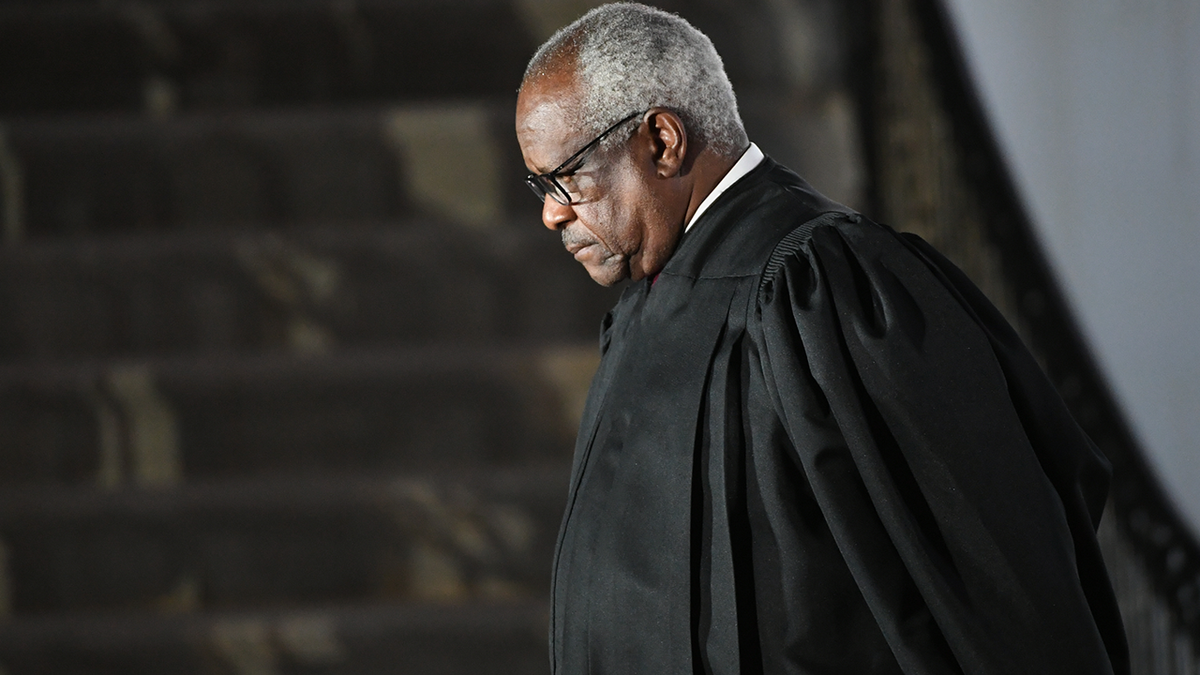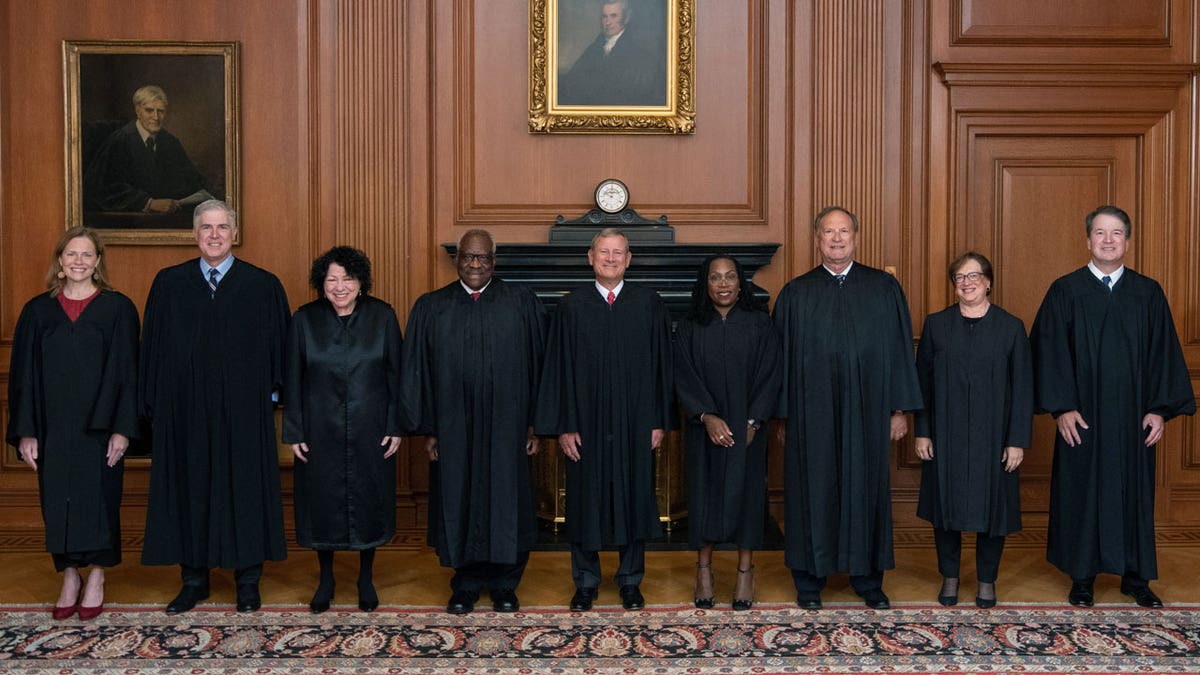
In the court's latest ruling upholding a Republican Party-drafted redistricting map in South Carolina, Justice Clarence Thomas took aim at a landmark, decades-old civil rights decision, calling it an “outrageous decision.” [use] of the judiciary.”
On Thursday, the Supreme Court sided with South Carolina's Republican-led Legislature after it was challenged over alleged racist gerrymandering in drawing new redistricting maps.
In a 6-3 ruling written by Justice Samuel Alito, the Supreme Court said that “a party challenging the constitutionality of a map must disentangle race from politics if it wishes to prove that the Legislature was motivated by race and not partisanship.” . In assessing the work of a legislature, we begin with the presumption that the legislature acted in good faith.”
In a concurring opinion, Justice Thomas wrote that the 1954 decision Brown v. Board of Education – written by his predecessor, Justice Thurgood Marshall – introduced an “extravagant [use] of the judiciary.”
LIBERAL JUSTICES DESERVE PRAISE FOR 'INDEPENDENCE' AT THE SUPREME COURT, BUT THOMAS REALLY STANDS ALONE, EXPERT SAYS
Supreme Court by Judge Clarence Thomas (Photo by Jonathan Newton/The Washington Post via Getty Images)
The Brown decision held that segregating children in public schools based on race was unconstitutional, and rejected the “separate but equal” legal doctrine.
Thomas, who grew up in the segregated South, has repeatedly stated that the Constitution prohibits discrimination on the basis of race, regardless of its intent and its devastating consequences.
In last year's case banning affirmative action in college admissions, Thomas wrote a concurrence “to offer an originalist defense of the colorblind Constitution” and to “clarify that all forms of discrimination on the basis of race – including so-called positive discrimination – are prohibited under the Constitution; and to highlight the harmful consequences of all this discrimination.”
“Individuals are the sum of their unique experiences, challenges and achievements,” he said. “What matters is not the barriers they face, but how they choose to confront them. And their race is not responsible for everything – good or bad – that happens in their lives.”
In 1995, Thomas wrote a lone conclusion in the case of Adarand Constructors, Inc v. Peñawhich states that the government's “benign discrimination” in trying to help racial minorities perceived to be disadvantaged is another form of insidious “racial discrimination, plain and simple.”
Thomas's point in his concurrence in the case decided Thursday is that federal courts are not qualified to determine how voting cards are designed.
“The Constitution gives courts no power to draw districts, let alone standards by which they can attempt to do so,” he said.
“And it does not give courts permission to engage in the race-based reasoning that has come to dominate our voting rights precedents. It is well past the time for the Court to put these political issues back where they belong: the political branches,” he said. said.
Thomas said that “the Court once recognized its limited, equitable powers in this area.” The federal courts have the authority to grant remedies, such as monetary damages, or equitable remedies, such as enforcing or prohibiting a particular action.
'We have acknowledged that before'[o]Of course, no court can reframe the situation [a State’s] districts to bring them more into line with the standards of equity for a representative system. At best, we can only declare the existing electoral system invalid.'”
CLARENCE THOMAS SAYS HE RECEIVES 'BARENESS' FROM CRITICS, DESCRIBES DC AS A 'HORRIBLE PLACE'

U.S. Supreme Court Justice Clarence Thomas listens during a ceremony on the South Lawn of the White House in Washington, DC, on Monday, October 26, 2020. (Photographer: Al Drago/Bloomberg via Getty Images)
But he said that the Brown decision – which was made 70 years ago, almost to the day of Thomas's assent – introduced “[t]He considers the fairness necessary to justify a judiciary's ability to draw cards.”
'The Court's 'impatience with the pace of desegregation' caused by opposition to Brown v. Board of Education “led us to adopt extraordinary recovery measures,” he said.
Thomas explained that in the subsequent case against Brown, the Court took into account “the manner in which damages were awarded.” [was] awarded” to justify “the fundamental principle that racial discrimination in public education is unconstitutional.”
“In doing so,” Thomas wrote, “the Court took a limitless view of equitable remedies, describing equity as 'characterized by a practical flexibility in shaping the remedies and by an ability to adapt public and private needs and to reconcile with each other.'
“That insight may have justified temporary measures to overcome 'the widespread resistance to the dictates of the Constitution' that prevailed at the time, but in general: '[s]Such extravagant use of judicial power is at odds with the history and tradition of equality power and the design of the Framers,” he said.
“Ultimately, to combat racial gerrymandering or the dilution of votes, someone has to draw a new map. I can't find an explanation as to why that “someone” could be a federal court judge [and not the state legislature],” he said.
JUSTICE THOMAS HAS RAISED A CRUCIAL QUESTION ABOUT THE LEGITIMITY OF THE SPECIAL ADVISER'S PROSECUTION OF TRUMP

Supreme Court Members (L-R) Associate Justices Amy Coney Barrett, Neil M. Gorsuch, Sonia Sotomayor, and Clarence Thomas, Chief Justice John G. Roberts, Jr., and Associate Justices Ketanji Brown Jackson, Samuel A. Alito, Jr. Elena Kagan and Brett M. Kavanaugh pose in the Justices Conference Room prior to the formal inauguration ceremony of Associate Justice Ketanji Brown Jackson on September 30, 2022 in Washington, D.C. (Collection of the Supreme Court of the United States via Getty Images)
Thomas went on to say that the Supreme Court's case law on redistricting “puts states in a lose-lose situation.”
He was referring to the court's decision last term, which ruled in favor of black voters in Alabama and challenged the state's Republican congressional map, which the court majority said likely violated the Voting Rights Act. The VRA prohibits voting practices or procedures that discriminate on the basis of race.
But Thomas and two of his colleagues disagreed, saying, “The question is whether [Section 2] of the law, as amended, requires the state of Alabama to intentionally redraw its longstanding congressional districts so that black voters can control a number of seats roughly proportional to the black share of the state's population. Section 2 requires no such thing, and if it did, the Constitution would not allow it.”
CLICK HERE TO DOWNLOAD THE FOX NEWS APP
Thomas argued in his Thursday concurrence: “Taken together, our precedents support the rule that states should consider race just enough in drawing districts.”
“And what 'just enough' means depends on a federal court's answers to legally unanswerable questions about the proper way to apply the state's traditional districting principles, or about the group-wide preferences of racial minorities in the state,” he said.
“There is no density of minority voters that this Court's jurisprudence cannot transform into a constitutional controversy. We've extracted years of lawsuits from each district cycle with nothing to show for it. The Court's involvement in congressional district cases is unwarranted and counterproductive,” he said. concluded.













